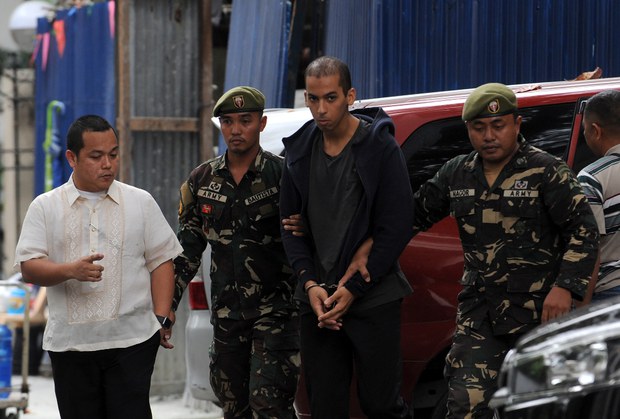Spaniard Among 2 Suspects Arrested in Philippines with Alleged IS Ties
2018.01.24
Cotabato, Philippines
 Philippine soldiers escort Abdelhakim Labidi Adib (C), an alleged Spanish national and supporter of the militant group Islamic State (IS), as he arrives at the Department of Justice (DOJ) building in Manila, Jan. 24, 2018.
Philippine soldiers escort Abdelhakim Labidi Adib (C), an alleged Spanish national and supporter of the militant group Islamic State (IS), as he arrives at the Department of Justice (DOJ) building in Manila, Jan. 24, 2018.
Philippine security forces said Wednesday they had captured a Spanish supporter of Islamic State-linked militants and the widow of a Filipino leader of last year’s siege in southern Marawi city through separate arrests.
The Philippine military said it arrested a man identified as Spaniard Abdelhakim Labidi Adib, 20, earlier in the week on the southern island of Basilan, where he allegedly was associating with militants from the Abu Sayyaf Group, the country’s most notorious Islamic extremist group.
He was carrying a bag containing bomb-making components when caught trying to evade arrest, authorities said.
The widow, Najiya Dilangalen Karen Maute, was arrested Tuesday afternoon when police operatives stormed her house in southern Cotabato city, Senior Inspector Jemar delos Santos said.
“The wife of the demised Abdullah Maute of the ISIS-inspired Maute group was arrested for rebellion,” delos Santos said in a brief report, referring to Islamic State (IS) by another acronym.
The widow was among dozens of known Maute supporters and planners whose names were listed on an arrest order, he said.
“This is a result of continuous intelligence gathering and hard work of PNP (Philippine National Police) personnel,” delos Santos said, adding that the woman was being kept in a regional detention center.
Abdullah Maute and his brother, Omarkhayam, and their followers provided firepower to Isnilon Hapilon, the acknowledged head of IS in Southeast Asia, in laying siege to Marawi in May 2017.
More than 1,200 people were killed in a five-month battle that ensued. A majority of the dead were militants, including Hapilon, while the rest were soldiers, policemen and civilians.
Spanish suspect
Hapilon, prior to assuming the role of the IS leader here, was a senior commander of Abu Sayyaf, or Bearers of the Sword, who was wanted for a string of kidnappings, bombings and beheadings of hostages, including of a German and two Canadians during the previous two years.
Abdelhakim Labidi Adib, the Spanish national, was arrested while trying to pass through a road block in Basilan island on Monday, military officials said. He was travelling with a Filipino companion who was on a military target list, officials said.
The men tried to escape but Adib was caught.
He was escorted to the Philippine Justice Department in Manila on Wednesday, where the military presented evidence and state prosecutors filed terrorism-related complaints against him, said Capt. Exequel Panti, the commander of Special Forces in Basilan.
Adib denied the allegations, according to Panti, who said that the Spaniard told military interrogators that he had arrived in Manila in October, before visiting several cities in the south.
But Adib failed to adequately explain what he was doing on Basilan and why he was accompanying an Abu Sayyaf militant, Panti said.
The arrest came days after Philippine police said they had arrested a 64-year-old Iraqi bomb expert who had alleged ties to the Middle Eastern militant group Hamas, Taha Mohamed Al-Jabouri. Police were checking on Al-Jabouri’s activities here and whether he had made contacts with Filipino militants.
The battle of Marawi was declared over in October, after the government announced the deaths of top Islamist fighters, including Hapilon, Malaysian bomb expert Ahmad Mahmud and Omarkhayam.
After Philippine government forces defeated the militants in Marawi, President Rodrigo Duterte asked Congress to extend military rule in the south for the whole of 2018, noting that there were nearly 200 other militants and their supporters who were still believed to be at-large.
In November, Philippine authorities arrested Omarkhayam’s Indonesian widow, identified as Minhati Madrais.
After the battle ended other extremist groups took up the fight and assumed the IS leadership role in Mindanao, the country’s largest island in the south where Islamic militancy has raged since the early 1970s.







